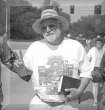| Words from Fr. Frank Cordaro |
March 31, 2002
Update And Easter Reflection
Correctional Corporation of America, Inc.
Leavenworth, Kansas
My tenure at Pottawattamie County jail was short lived. After only a week, the United States Marshalls collected me and four others, along with inmates from Sarpy County, Douglas County, and Lincoln, Nebraska (15 in all in one van, handcuffed and shackled) and drove us to Leavenworth, Kansas. They brought us to the Leavenworth Correctional Corporation of American, Inc. (CCA) facility. This is a non-profit holding facility that has a contract with the Federal Bureau of Prisons (BOP). It holds about 550 inmates.
This is a new experience for me. Iíve never been in a for-profit jail. Designed to be a short term holding facility, most of the inmates are in transit, either heading for court, returning to a federal prison, or being transferred to a new federal prison. From what I can gather, the average stay is between a month to six weeks. One guy in our mode has been here over a year.
In the world of prisons and jails, this place ranks somewhere between a large county jail and a medium federal prison. Orange is still the dominant color for inmate attire. Iím in a two-tier mode with twenty two-man cells. Everything is bolted down and made of steel. The common area is much bigger than the mode I was in at Pottawattamie County. This food is a bit better. The store has more selection. There is outdoor recreation. The prison population is generally older and more sophisticated than your typical, county jail populations. It is more ethnically diverse than in Council Bluffs and is evenly divided between African Americans, Hispanics, and Whites.
Drugs are clearly the dominant and consistent factors in most peopleís reasons for being here, either directly because of some drug charges or indirectly because of criminal activity related to drug use. One other universal factor for each inmate is a web of broken relationships, beginning with families, friends, and loved ones, extending throughout the whole of society. Each inmate has his own unique, personal story. I spend a lot of time listening to these stories, offering prayers, and comfort one person at a time.
It always amazes me how so many Christians and Christian churches in the USA are gung-ho "law and order" people. So much of what Jesus and the Jesus movement was all about, according to the New Testament, was outlawed and counter cultural behavior. In almost every chapter of the four gospels, Jesus is breaking some kind of law or rule, either social, legal, or religious.
Most folks attending Easter services are not aware that the very act of the Resurrection was an act of civil disobedience. When the State orders a person executed, they are supposed to stay dead. If they rise from the dead, they are breaking the law.
In Matthewís Easter story the outlaw nature of Jesusí resurrection is very clear. The Jewish authorities ask Pilate to station Roman soldiers to guard the entrance to Jesusí tomb (Mt 27:62). The seal of Rome was placed on the tombís entrance. Anyone who dared to break that seal would be breaking the law of Rome and subject to death. On Easter Sunday morning the resurrected Jesus broke that seal, broke the law of Rome, and assured lifeís victory over death and sin.
At a much deeper level, there is something very subversive about believing in the resurrection of Jesus. Throughout his life, in word and in deed, Jesus took bold stands against all forms of injustice and sin, from the most personal sins of the human heart (micro) to the most communal and social sins found in human systems and structures (macro). These sins were played out in the religious, political, and economic institutions of his day. St. Paul called these the "Powers and Principalities.." All these injustices and sins are based on lies and their ultimate by-product is death. When Jesus took his struggle to the cross, unto his death, he took on evilís ultimate lie, the lie that death has the final say over the human spirit and essence. What happens on Easter Sunday morning is our bet that love is stronger than hate, that life does not end in death, and that the truth of God is more powerful than the lies of evil.
To be a true believer in Jesusí resurrection, one must both proclaim the eternal life gained by Jesusí death and resurrection and live a life of active, non-violent resistance to injustice and sin, on all levels (macro and micro).
There are some who say all you need to do to claim the saving power of Jesusí death and resurrection is to proclaim the love of God in your heart. But that is not enough. Some say all you need to do is to proclaim the love of God in your heart and selectively confront and resist the injustices and sins in the world. But that is not enough. The Easter reality demands a total package, a total program.. We are called to proclaim the saving power of God while resisting the injustices and sins of this world wherever it may lead us.
